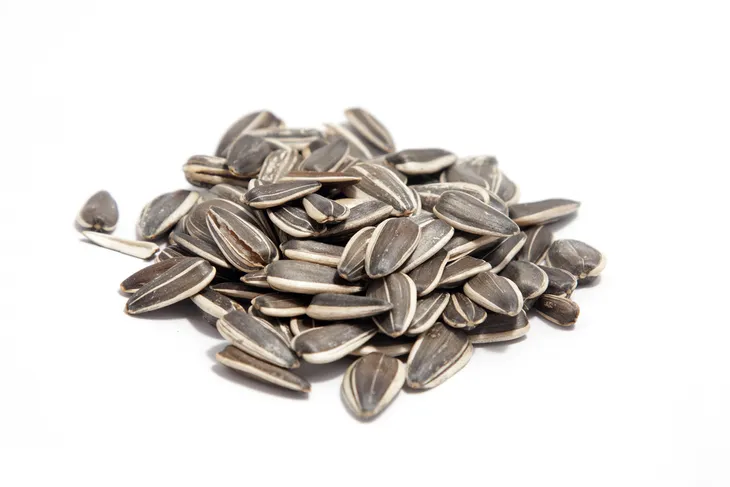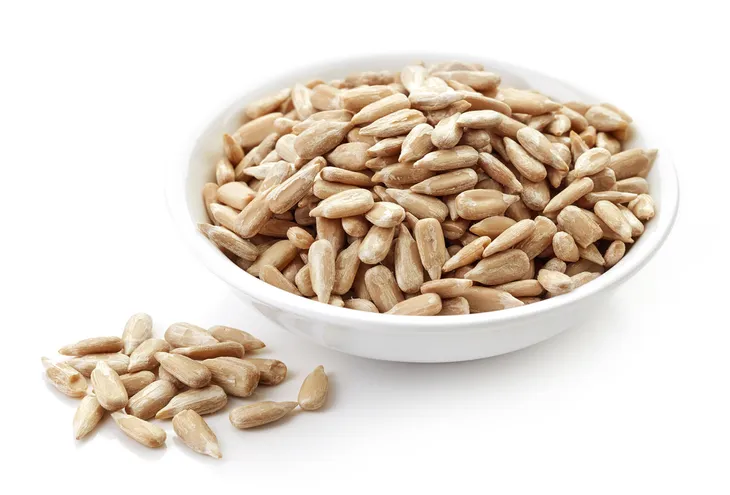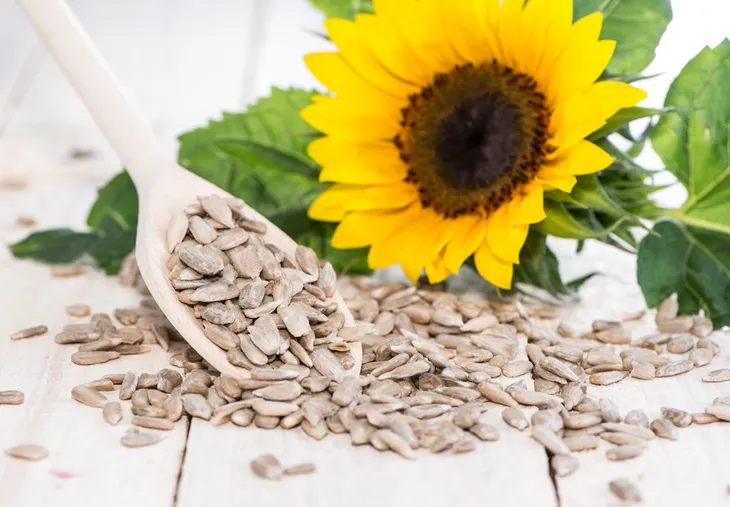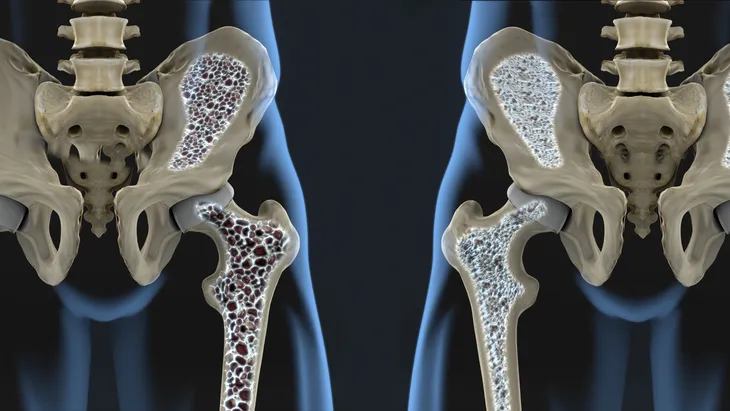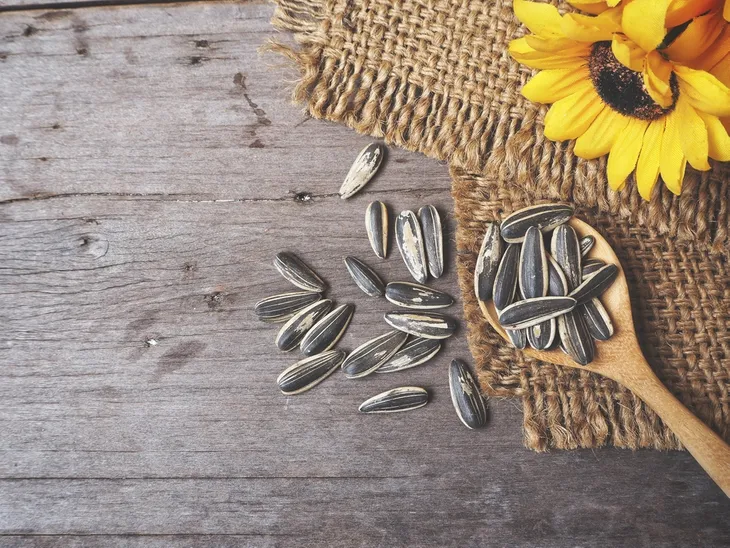Sunflower seeds are one of those snacks we’ve all tried but probably don’t enjoy on a regular basis. While they’re popular enough, they’re not quite on the same level as potato chips, chocolate bars, peanuts, or almonds.
And, to some extent, that’s a shame, since unlike potato chips and candy bars, they do have significant nutritional value. While they do contain their fair share of fat and calories, sunflower seeds are packed with essential fatty acids, vitamins, and minerals. Consumed in moderation, they can be an important part of a healthy, high-energy diet.
Good for Your Heart
There are few organs more important to your overall health than your heart and the wider cardiovascular system. Failing to take care of your heart by following a healthy diet and exercising regularly can lead to heart disease, heart attack, and stroke.
Sunflower seeds can help protect your heart because it’s a good source of vitamin E, an antioxidant that can help prevent free radicals from oxidizing cholesterol. By limiting the buildup of cholesterol in the arteries around the heart, sunflower seeds can ensure that the heart continues functioning as it should.
Helps with Digestion
Millions of Americans struggle with digestion, from acid reflux to upset stomach and constipation. Many of these issues are related to an unhealthy diet that’s high in fat, calories, sugar, and salt, and far too low in one thing: dietary fiber.
Put simply, fiber helps usher our food through our digestive system, from the moment it’s swallowed and reaches down the esophagus to the stomach to the minute it exits the body via a washroom visit. Sunflower seeds are high in fiber, which means they can go a long way to helping individuals with trouble effectively digesting their food and staying “regular.”
Fight Cancer
There are few diseases more feared than cancer. And while there are many different types of cancer, each with their own mortality threat, no one ever wants to receive a cancer diagnosis. Each and every year, millions of Americans die from cancer, with many more struggling to lead normal lives as a result of receiving a cancer diagnosis.
Sunflower seeds can help in the fight against cancer because they contain a number of vitamins and minerals, like vitamin E, selenium, and copper, that all possess antioxidants. Medical research suggests that diets containing foods with antioxidants can help prevent the development of cancer cells in all parts of the body, from the colon and prostate to the lungs, breasts, and so forth.
Build Stronger Bones
For generations, we’ve turned to a few popular food choices in search of calcium, a mineral that can help us build stronger bones. In the past, this has often resulted in the consumption of dairy products, like milk and cheese, both of which contain ample amounts of calcium.
But it’s not just calcium that can help us build stronger bones. Magnesium, which can be found in sunflower seeds, also contributes to the strengthening of our bones, allowing us to withstand injuries better and recuperate faster. Sunflower seeds are also a great source of copper, which can help enhance the flexibility of our bones and joints.
Sleep Better
If you’ve ever found yourself struggling to stay awake after a big turkey dinner, then you have some understanding of the effects of tryptophan, the essential amino acid that can be found in turkey meat. But this type of poultry isn’t the only source of tryptophan, which helps produce a feeling of relaxation that often leads to sleep.
In fact, sunflower seeds also contain tryptophan, which can help to relieve tension and put us in the mood for relaxation and rest. That could make sunflower seeds a great late-night snack for anyone who tends to have evening cravings and a hard time getting to sleep.
Boost Your Memory
It can be incredibly hard to lead a normal, healthy lifestyle when you struggle with either short- or long-term memory problems. Although these issues typically affect people later in life, particularly if they have a family history of dementia, people of just about any age group can benefit from a memory boost.
Sunflower seeds may be able to help improve memory because they contain choline, a compound that’s been linked with heightened cognitive functionality. Additionally, the magnesium contained in sunflower seeds can help reduce the frequency of migraine headaches, which can also help with the effectiveness of memory.
Lower Blood Pressure
Maintaining healthy blood pressure levels becomes progressively more important as we age. In time, our hearts face growing challenges, particularly if our diets include a lot of high-fat, or high-calorie foods. If we continue to eat these kinds of foods, there’s a good chance cholesterol will build up in our arteries, resulting in higher blood pressure and a growing threat of heart disease.
That’s why, no matter your age, it’s worth trying to find and consume foods that can help us maintain a healthy blood pressure level. Sunflower seeds can help because they contain potassium, which has been shown to help regulate sodium in the blood and overall blood pressure levels. This can help cut the risk of hypertension and the threat of heart disease, which includes heart attack and stroke.
Reduce Inflammation
Inflammation can cause a lot of problems in the body. It’s usually the first thing that happens following some kind of infection; it can be part of the body’s reaction to a significant health issue. Generally speaking, we should be searching out and consuming foods that can help reduce inflammation.
Sunflower seeds can help, as they contain antioxidants, like vitamin E, which have been shown to significantly reduce inflammation. Vitamin E in particular can help neutralize free radicals that can pose a threat to our cell membranes. Left untreated, this process can result in the emergence of problematic health issues, from asthma to arthritis.
Feel Full Longer
Tens of millions of Americans struggle with maintaining a healthy body weight. The problem is that so many of the foods that are readily available to us, like those sold in fast food restaurants, are high in carbohydrates but not protein or fiber, both of which help keep us feeling full for longer.
Sunflower seeds are an excellent source of protein, particularly for a food that is not a type of meat. Protein helps keep us feeling full, meaning it can help curb snacking and prevent us from binging on less healthy foods, from burgers and fries to sundaes and milkshakes.
Fight Osteoporosis
Osteoporosis affects millions of Americans. How so? It targets the bones, particularly in women, and can lead to bones becoming frail and fragile. Left untreated, osteoporosis can result in regular, considerable pain, and may even lead to broken bones.
You can help fight osteoporosis by consuming more protein, which can help strengthen the muscle tissue that connects and supports our bones. It’s pretty simple: if the muscles linking our bones together are stronger, then our bones will be more likely to withstand movements that could result in damage and pain. For vegans and vegetarians, sunflower seeds could be a great alternative to meat in the search for protein.
Build Muscle
To build muscle effectively, we need a consistent supply of protein. Ask any athlete or bodybuilder — professional or amateur — and they’ll tell you that regularly consuming foods high in protein play an important role in building progressively more effective muscle and helping make us stronger. It’s also an important part of enhancing our overall endurance.
Sunflower seeds can help, as they’re an excellent source of protein. They may be most helpful for vegans and vegetarians who do not eat meat, like poultry, beef, or pork, on a regular basis.
Be More Resilient
Sunflower seeds, when consumed on a regular basis, may provide us with the ability to be more resilient to physical injury and illnesses. How so? There are a few ways.
For one, sunflower seeds contain zinc, a nutrient that can help give our immune system a boost, thereby lowering the chance of infection. Second zinc can help us recover from physical wounds, like a scraped knee to a paper cut. And it’s not just zinc that helps: the vitamin E in sunflower seeds has also been shown to give our immune systems the lift it needs to fight off nagging coughs and colds.



